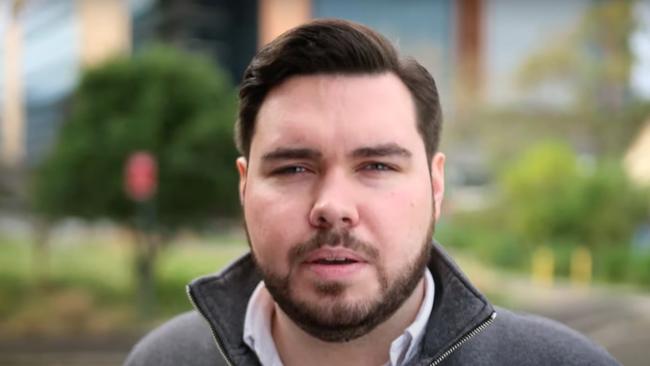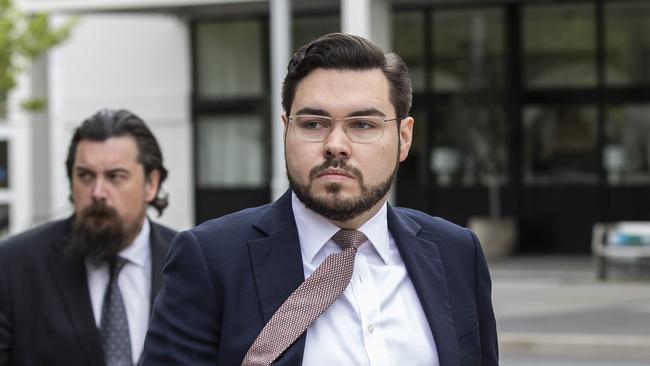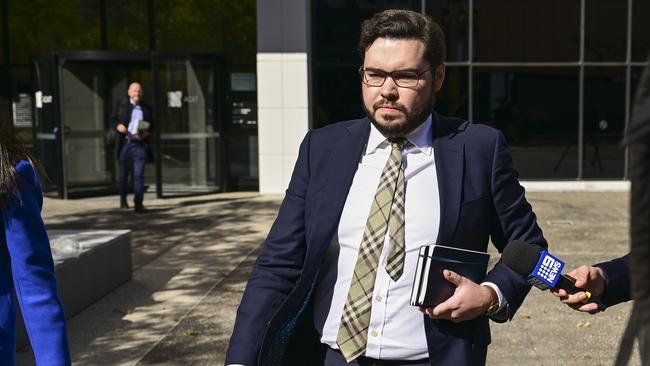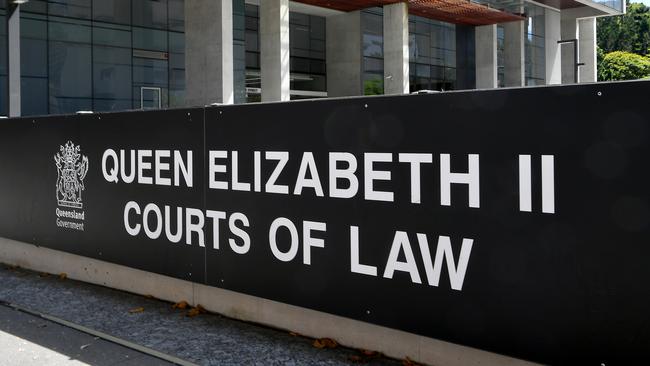Inside the fight to name ‘high profile’ rape-accused Bruce Lehrmann – and why he could only be revealed now
Former parliamentary staffer Bruce Lehrmann has been named as the high profile man accused of raping a woman, 10 months after he was charged.
Former parliamentary staffer Bruce Lehrmann has been revealed as the “high profile man” charged with two counts of rape, following a major court ruling.
“Archaic” legislation in Queensland preventing media outlets naming or otherwise identifying people charged with serious sexual offences meant he has only been referred to by that mysterious title from the moment he first appeared in court in January this year.
Parts of that legislation changed in September, meaning those accused could now be named before they were committed for trial or entered a plea.
But Mr Lehrmann had sought a non-publication order to continue to keep his name from public view, a bid that ultimately failed on Thursday.

Previously, under section 7 of the Criminal Law (Sexual Offences) Act 1978 in Queensland, media outlets could not reveal the “name, address, school or place of employment … or any other particular likely to lead to identification” of a person charged with a prescribed sexual offence.
The full section reads:
(1) Any report made or published concerning an examination of witnesses in relation to a prescribed sexual offence, other than a report specified in section 8, shall not reveal the name, address, school or place of employment of a defendant therein or any other particular likely to lead to identification of a defendant therein unless the justices taking the examination, for good and sufficient reason shown, order to the contrary.
This “prescribed sexual offence” includes people charged with rape, attempted rape, assault with intent to commit rape, and sexual assault.
These protections would only be lifted for media outlets once a person is committed to stand trial in a higher court.
Mr Lehrmann could therefore only be referred to by that title, lest the publication of any other details like his full name, workplace or residence lead to his identification.

Individuals who breach this – including journalists – face up to $15,480 in fines (100 penalty units or two years’ jail, or even contempt of court charges.
Corporations such as media outlets face up to $154,800 in fines (1000 penalty units).
Until October 3, Queensland was the only state in Australia to have this law remain in place – alongside the Northern Territory.
On that date, these restrictions were scrapped by the state government.
Media outlets were due to name Mr Lehrmann until his lawyers successfully sought a non-publication order from Queensland’s Supreme Court on September 29.
In his initial decision, Supreme Court Justice Peter Applegarth said the case had attracted “publicity” and it would be “contrary to the interests of justice” if his application for a non-publication order was not allowed.
“Without such a temporary order … his statutory right to apply for an (interim) order would be rendered nugatory and the application would have no utility,” Justice Applegarth said.
During a hearing at Toowoomba Magistrates Court on October 13, Mr Lehrmann’s lawyers sought for that order to be continued in the interests of their client’s protection from harm.
This was opposed by lawyers for media outlets, including NCA NewsWire.
Andrew Hoare, the defence barrister representing Mr Lehrmann, argued there was a “real, existing risk” their client would self-harm should his identity be revealed.
Letters from a psychologist were tendered to the court as evidence.
Mr Hoare submitted his client suffered from “severe” suicidal ideation that had manifested over years.
Robert Anderson KC, acting for the media outlets, said Mr Lehrmann had not come to court that day to give evidence about his mental health conditions, instead relying on his solicitors and doctor’s letter.
Mr Anderson submitted the defendant was ready to speak his own truth but was still asking this court to prevent the public from knowing who he is and prevent open justice.
“There is an incredulity between the applicant’s public presentation and what is said by … (his) doctor,” he said.
“It was irreconcilable.
“The applicant has not said anything to Your Honour directly. He has chosen to stay silent.”

Magistrate Clare Kelly ultimately ruled there was no such need for the order to continue as the Mr Lehrmann’s legal team had not demonstrated the order was necessary for his protection.
She said issues with potential jurors being affected for any upcoming trial could be remedied through sufficient directions or judge-alone trials.
Despite refusing the order, Mr Lehrmann’s legal team successfully sought a stay of the order until they lodged proceedings in a higher court.
Those proceedings occurred on Thursday at the Supreme Court, where the non-publication order was finally lifted.
During the judicial review hearing, the man’s defence barrister Andrew Hoare told the court the Magistrate’s decision should be quashed and the non-publication order continued.
He said if his client was to be identified, he would be at an increased risk of “catastrophic” self harm.
Mr Hoare said the sitting Magistrate made an error in determining his client had chosen not to seek medication or see a psychologist.
“The risk is greater if there is not that support in place (or) engagement with health professionals,” he said.
“The use of the term ‘That is his choice’ imports a type of obligation on the applicant.”
Mr Hoare told the court a doctor’s report noted a “deterioration” of the man’s mental state from June, when he participated in a media interview, with others broadcast in the months following.

The court was told a forensic psychologist held “grave concerns” for the high-profile man’s mental health.
But Rob Anderson KC, appearing for the media entities, questioned the likelihood of harm to the applicant by noting he had appeared on other broadcasts since June.
He emphasised the doctor’s opinion of his “deterioration of (the man’s) mental state”.
“There is no error of law,” Mr Anderson said of the Magistrate’s decision.
Supreme Court Justice Peter Applegarth noted the applicant had presented himself on other media programs several times.
“It was relevant, that he was on national television … even in so far as it’s relevant to an assessment on what weight you put on the doctor’s report,” he said.
In his published reasons, Supreme Court Justice Peter Applegarth said the Magistrate’s decision was not affected by any errors.
“The evidence before the magistrate included evidence that the potential naming of the applicant prior to the conclusion of the committal proceeding weighed heavily on him and had affected his mental health,” Justice Applegarth said in his judgment.
“This unfortunate effect on his mental health permitted, but did not compel, a finding that a non-publication order was necessaryto protect the applicant’s safety.”
Justice Applegarth said Mr Lehrmann had not established the Magistrate’s decision was unreasonable in the legal sense “or so unreasonable that no reasonable magistrate could have made that decision”.



